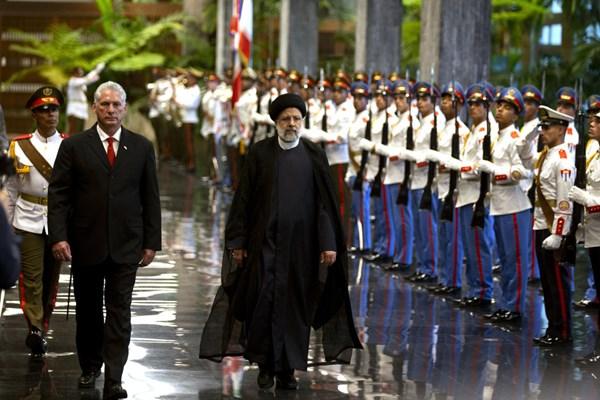The importance and geopolitical, geo-economic, and geostrategic position of Latin America, especially Venezuela, in the world on the one hand, and domestic, regional, and international consequences of the expansion of Iran’s strategic relations with Latin America on the other hand, have added to the importance of the president’s tour.
The trip is important from various dimensions and includes strategic consequences, some of which are as follows:
One, since the departure of the colonial governments of Spain, Portugal, Britain, and France from Latin America, the United States considers this region as its “backyard.” A major part of the problems that existed in Latin America in the past decades and still continue in some countries was caused by the colonial interventions of the United States. The Pinochet coup in Chile, the Contra war in Nicaragua, and the death squads in El Salvador are among the darkest periods in the history of Latin America, in which the United States played a major role in their occurrence in the form of the “Monroe Doctrine.”
Over the past two decades, US influence in Latin America has been declining. The region’s countries increasingly act “independent” of the US and its interests. Distancing from the US and half of the countries, “anti-Americanism” is becoming a dominant “approach.” At present, half of the countries of Latin America and more than 80 percent of its area are made up of anti-American governments. Today, the Biden administration is heavily criticized for its policies’ ineffectiveness and unfavorable performance in Latin America.
At the same time, the interest of the countries of that region at governmental and non-governmental levels to expand strategic relations with the Islamic Republic of Iran, which was clearly evident in the recent visit of the president of the Islamic Republic of Iran to Venezuela, Cuba, and Nicaragua, is an issue that is very difficult for the Americans to accept.
The reaction of the US government to Mr. Raeisi’s trip to Latin America, manifested in the statements of John Kirby, Coordinator for Strategic Communications at the National Security Council in the White House, clearly shows the “strategic importance” of that trip.
For the US, the development of political, economic, and discourse influence of the Islamic Republic of Iran near the borders and, so to speak, in its backyard is a “fundamental challenge”; to a country that has been seeking to contain the Islamic Resistance Front for many years in West Asia, is now witnessing the expansion of the depth and scope of the “anti-imperialist discourse” which has many aspects in common with the “resistance discourse.”
Two, Latin America is a wealthy region in terms of land and underground resources, and this has made it play an increasing role and importance in the post-Cold War period and has attracted the attention of major regional and international powers.
For example, Venezuela, one of Iran’s partners in Latin America, has vast resources that, due to infrastructure problems, sanctions, and lack of new technologies, cannot exploit all of them. This is considered a unique “opportunity” for the Islamic Republic of Iran to increase its “strategic depth” in that region while raising the level of bilateral relations as a win-win equation.
Currently, Iran’s exports to Venezuela amount to 3 billion dollars, which is more than the US exports to that country! In the recent visit of the president of the Islamic Republic of Iran, the goal setting for 1404 (2025) was defined as more than 20 billion dollars. In the past three years, the Islamic Republic of Iran has significantly increased its cooperation with Venezuela in the field of energy, including offshore refineries and the shipment of heavy crude oil.
Three, Iran’s view of Latin America and its countries is mainly “geo-economic” and economic rather than ideological and security. Therefore, the economy is the most important field of Iran’s relations with some countries in that region. In the new era, the Islamic Republic of Iran seeks to improve its geo-economic position in Latin America’s existing and potential value chains.
Venezuela, Cuba, and Nicaragua are the foundations of Iran’s “geopolitical balance” in the Latin American region, and strengthening the “geo-economic aspects” of relations with those countries, especially in the economic, commercial, and infrastructure dimensions, is an “undeniable necessity.”
Of course, the expansion of relations between Iran and three Latin American countries based on geo-economic components cannot mean ignoring other dimensions, including the “geopolitical” and “ideological” fields. In any case, it should be emphasized that confronting the US unilateralism in the world is one of the important priorities of Iran’s foreign policy, which cannot be ignored.
Four; In the end, it is necessary to pay attention to two important points: First, in addition to Venezuela, Cuba, and Nicaragua, other important countries in Latin America have discursive and historical similarities with the Islamic Republic of Iran in terms of idealism, civilizational and cultural ties, anti-colonial and anti-arrogance struggles, as well as having outstanding symbols and personalities, resistance and standing.
The growing trend of left-wing governments coming to power, including in Brazil, Colombia, Argentina, etc., which has strengthened the “block of anti-imperialist countries” in Latin America, is a good opportunity to be seriously considered in deepening and expanding Iran’s strategic interactions with those countries.
Secondly, the Islamic Republic of Iran has important capacities in various “science and technology fields.” It is one of the leading countries in the world in some areas of industrial technology, nuclear, space, nano, stem cells, medicine, etc.
This is a “unique opportunity” for the Islamic Republic of Iran and some Latin American countries, which are very rich in terms of natural resources and raw materials, but weak in terms of scientific and industrial facilities and technologies, to exploit their resources for the realization of “strategic cooperation.”
Considering this importance, and since establishing international scientific and technological cooperation in today’s world is of great importance and necessity, what should be regarded as a priority in developing strategic collaboration with Latin America today is “scientific and technology diplomacy.”










0 Comments